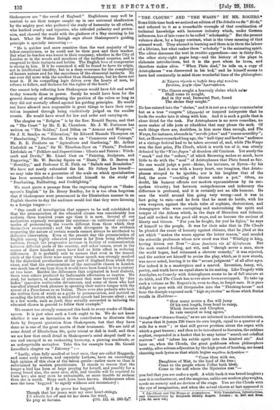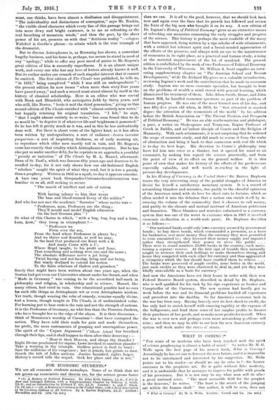" THE CLOUDS " AND " THE. WASPS " BY
MR. ROGERS.*
Some little time back we noticed an edition of The Scholia on the" Birds," and referred •to it as a remarkable example of that combination of technical knowledge with immense industry which, under German influences, has of late,come to be called " scholarship." But the present volumes show, by a happy contrast, what is the truer meaning of that misused word. They abound in learning and there• is in them the labour of a lifetime, but what makes them " scholarly" is the animating spirit. The editor discusses the text in erudite appendices—one in-thirty-five, the other sixty-eight pages long—and the history of the plays in elaborate introductions, but it is the poet whom he loves, and therefore makes alive. " When Plato died," he tells us, a copy of Aristophanes " was discovered in his bed," and he himself seems to have had continually in mind those wonderful lines of the philosopher: Al Xdpirer ream& Ts. XaPeir ore') otrx1 areweirag r,rr oiltra Itztrxip dpou'Aparrookirovt.
" The.Graces sought a heavenly shrine which ne'•r - Shall come to nought, And in thy soul, Immortal Poet, found The shrine they sought."
Ho has entered into the " shrine," and it is not as a vulgar commentator but as a true " exegete " (reerres) or inspired interpreter that he leads the reader into it along with him. And it is such a guide that is alone fitted for the task. For Aristophanes is no mere comedian, no mere maker of idle jests or ribaldries that may please the mob. Of such things there are, doubtless, in him more than enough, and The Wasps, for instance, abounds in "servile jokes" and " coarse scurrility"; but, as Horace remarked long ago, the " half-tipsy and lawless " audience at a vintage festival had to be taken account of, and, while The Wasps won the first prize, The Clouds, which is worth ten of it, was utterly defeated by the "W ineefiagon" of drunken old Cratinus. Yet surely the " muck" and the " ordure," of which Browning makes so much, have little to do with tho " soul " of Aristophanes that Plato found so fair. No one would judge a poet—Heine, for instance, or Byron—by his meanest. And it was with a heavy heart, one imagines, that Aristo- phenol; stooped to be ignoble; nor is his laughter that of the fool, the more " crackling of thorns under a pot." Often, no doubt, his humour offends our modern squeamishness by its out- spoken vivacity; but between outspokenness and indecency the difference is profound, and it is certainly not an idle humour. He sees the world around him going very wrong—and it was in fact going to ruin—and he feels that ho must do battle, with his own weapons, against the whole tribe of sophists, rhetoricians, and demagogues who were corrupting and undermining the spirit and temper of the Athens whioh, in the days of Marathon and Salamis, had still walked in the good old ways, and so become the saviour of liberty and Greece. " For you he fought, for you he fights," he says of himself to the people. It was for their sake that in The Clouds he pleaded the cause of honesty against chicane, that he jibed at the art which " makes the worse appear the better reason," and mauled the scientific professors whose new creed was that "Whirligig is king, having driven out Zeus"—Alves PacriXeCet rdr Ai' ifeXiXaedn. But the mob wanted fooling, not wit, and " though never a man, since the world began, had witnessed a cleverer comedy," it was rejected, and the author set himself to revise the play, which, as it now stands, was never acted, leaving it to the " secure judgment " of all after ages. For indeed it is a masterpiece and a marveL Invention, fanny, wit, poetry, and truth have an equal share in its making. Like Tragedy with Aeschylus, so Comedy with Aristophanes seems to be of full stature at its birth, and The Clouds has never since been overtopped. To take up such a volume as Mr. Rogers's is, even to-day, to forgot care. It is pure delight to pass with old Strepsiados into the " Thinking-house " and hear the disciple expound such " high mysteries " as those which Butler recalls in Hudibras-
" How many scores a flea will jump Of his own length, from head to rump, Which Socrates and Cleophon In vain essayed so long agono,"
though now "Science Gossip," as we are informed in a.characteristio note, " states that it jumps 200 times its own length, equal to a quarter of a mile for a man " ; or that still graver problem. about the organ with which a gnat buzzes ; and then to be introduced to Socrates, tho sublime sophist, suspended in a basket that he may better " search out celestial matters " and " infuse his subtle spirit into the kindred air," And later on, when the Clouds, the great goddesses whom philosophers worship, after solemn adjuration by the high priest of humbug, are heard chanting such lyrics as that which begins vap96ro« AuppeOpot- " Come thou with me, Daughters of Mist, to the land of the free ; Come, to the people whom Pallas hath blest, Como to the soil where the Mysteries rest "-
you feel that you are under a spell. A while back it was broad laughter ; now it is enchantment, and the magician, unlike our modern playwrights, needs no scenery and no devices of the stage. You see the Clouds with the eye of imagination, and when the actual chorus at last appeared it
• The Clouds and The Wasps of Arislophanes. With Tranalations, Introductions, end• Conunentaiies by Benjamin Lickley Rogers. London : Bell and how. (1.0e. Cal. each vol.] must, one thinks, have been almost a disillusion and disappointment. " The individuality and distinctness of conception," says Mr. Ruskin, " the visible cloud character which every line of this passage brings out into more dewy and bright existence, is to me as refreshing as the real breathing of mountain winds," and thus the poet, by the sheer power of his art, presents us with that " fictitious reality "—erlogene JVahrheit is Gocthe's phrase—to attain which is the true triumph of the dramatist.
But to discuss Aristophanes is, as Browning has shown, a somewhat lengthy business, and his fame is, perhaps, too secure to stand in need of any " apology," while to offer any poor meed of praise to Mr. Rogers's great edition of him is assuredly superfluous. It is an almost unique work, and every one who has any love of letters already knows it well. But its author makes one remark of such singular interest that it cannot bo omitted. The first edition of The Clouds was published, he tells us, " in 1852," being completed " while I was still an undergraduate " ; the present edition ho now issues " when more than sixty-four years have passed away," and such a record must stand almost by itself in the history of classical scholarship. Hero is an editor who was coeval with Monk and Blomfield, who anticipates Jebb by thirty years, and who still, like Nestor, " lords it mid the third generation," giving us this second edition of The Clouds enriohed with "almost entirely new notes," but happily retaining his original translation. " I felt," he says, " that I ought almost entirely to re-write," but soon found that to do so would be " to deprive it of whatever life and brightness it possessed." So he has left it pretty much as it was, and in this he has undoubtedly done well. For there is about verse of the lighter kind, as it has often been written by undergraduates, a sort of radiance—lumen iuvenlae purpureum—a sort of inspiriting freshness, as of early morning air, to reproduce which older men mostly toil in vain, and Mr. Rogers's verse has exactly that vitality which Aristophanes requires. But he has also put us under another debt, for he reprints in an appendix a youthful ' parody or imitation " of The Clouds by H. L. Mansel, afterwards Dean of St. Paul's, which was famous fifty years ago and deserves to be recalled to-day, for it not only shows how our old-fashioned English " scholars " caught the spirit of what they read, but it is less a parody than a prophecy. Written in 1852 as a squib, to-day it appears oracular. A bare two years back Strepsiades-Cottonarchocalicocraticus was familiar to us all, still seeking to secure
" The march of intellect and sale of cotton • • • With lasting infamy to him that wears The base and blood-stained livery of the soldier." And who has not met the academic " Socrates " whose motto was- " Professors, man, Professors are the thing ; They'll mould and model English education On the best German plan " Or what of this Chorus in which, " with a bug, bug, bug and a hum, bum, hum," they troop in triumphant I- " Professors we From over the sea,
From the land where Professors in plenty be;
And we thrive and flourish, as well we may,
In the land that produced one Kant with a K
And many Cants with a C; Where Hegel taught, to his profit and fame, That something and nothing were one and the same ; The absolute difference never a jot being 'Twist having and not-having, being and not-being, But wisely declined to extend his notion To the finite relations of thalers and grosehen."
Surely that might have been written about two years ago, when the Teuton had got even our Universities almost under his thumb, and when " Made in Germany " was coming to bo the accredited hall-mark in philosophy and religion, in scholarship and in science. Manse', like many others, had cried in vain. Our educational pundits had no ears for such idle things as Aristophanic wit or even Aristophanic wisdom. Yet truth, though wearing the robe of comedy, remains equally divine, and a lesson, though taught in The Clouds, is of undiminished value. For learning put to base ends is the ruin and not the strength of nations. It is the Professors of Germany, no whit less than the Prussian Junkers, who have brought her to the edge of the abyss. It is their discourses— think of Mommsen's worship of Caesarism !—that have corrupted the nation. They have sold their souls for gain and made themselves, for profit, the mere instruments of grasping and unscrupulous power. The spirit of the " Unjust Argument " ('ASixos Myer) has breathed through their lips, and it shall happen to them after their deserving :-
" Hear'st thou Heaven, and sleeps thy thunder ? Right Divine proclaimed for rapine, Laws invoked to sanction plunder ! Take a warning in thy triumph. Godless power is frail to trust : Sure the millstone of his vengeance ; late it grinds, but grinds to dust. Search the tale of fallen nations. Justice banished, rights forgot. History's record tells the sequel. Seek her place and she is not."































 Previous page
Previous page